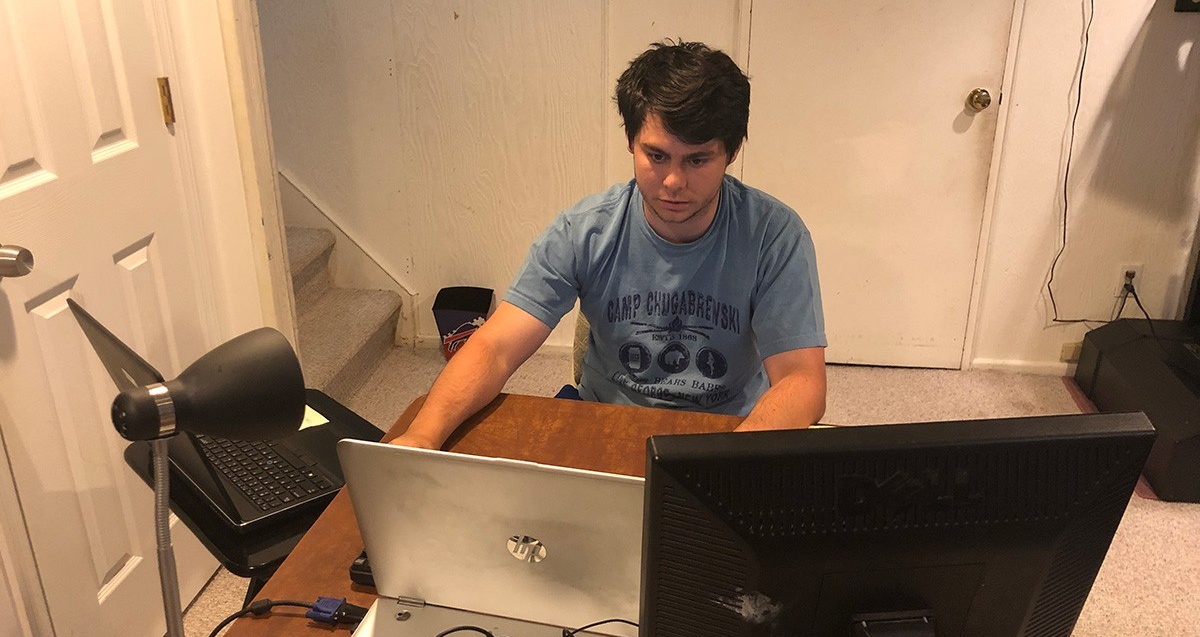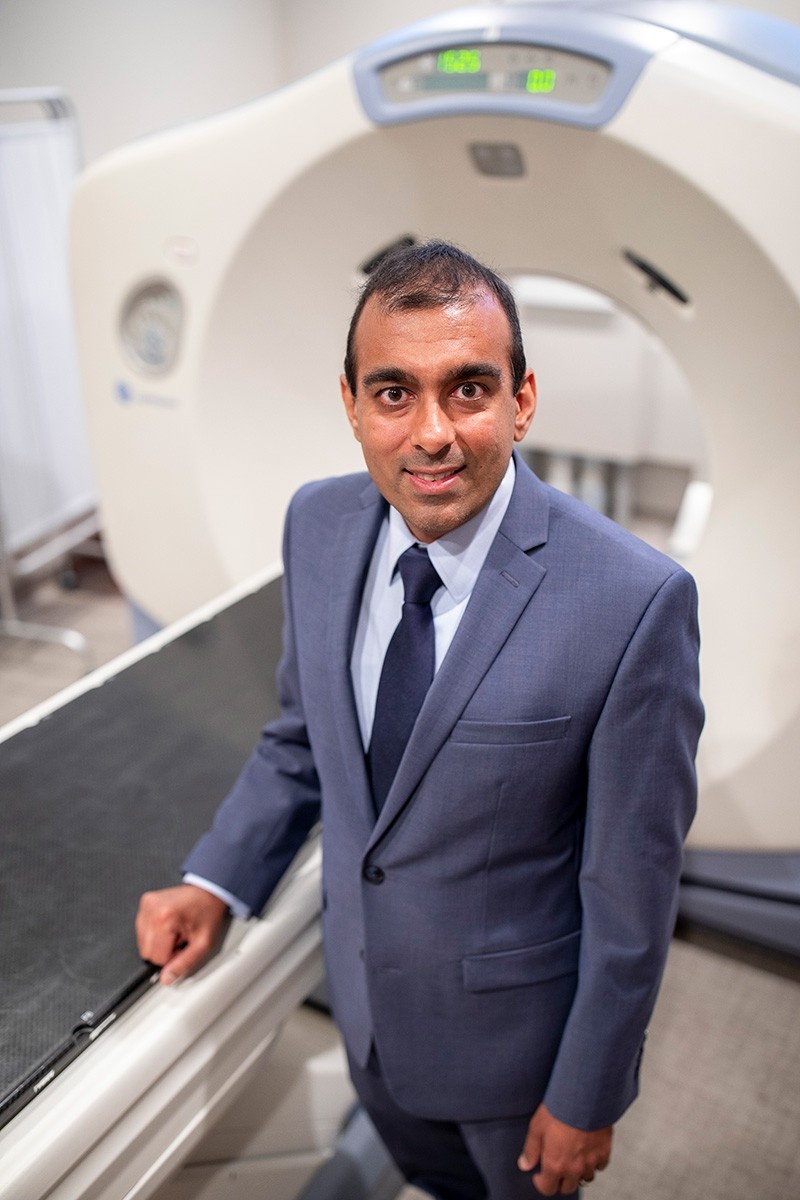Tenacity in the face of adversity
The student experience during COVID-19
By Kevin Manne
Spector studies in the basement of his home amid the COVID-19 pandemic.
Evan Spector knew he had a full plate heading into the spring 2020 semester. A dual-degree student, Spector was taking a total of 23 credits—17 for his MBA and six for his BS in industrial engineering.
What he didn’t know was that when he left campus for spring break, he wouldn’t be returning for classes. Instead, COVID-19 would send the world into disarray, and Spector—along with the rest of the UB student body and most of the world—would stay home for the foreseeable future.
For Spector, that meant sharing space with his family of five. The basement became his classroom, while upstairs, his mom led classes online for her elementary school students. His dad continued to go to work as a security guard, and his brother and sister became study-at-home college students, too.
“It’s challenging because there are a lot of distractions and you can’t just go to the library for a quiet space,” says Spector. “You can always hear what’s going on around the house.”
With New York City the epicenter of the outbreak in the U.S. and Spector’s family living on Long Island, the coronavirus hit their home. His mother and sister both tested positive for COVID-19, and everyone except his father tested positive for the antibodies.
“I showed symptoms,” he says. “I had a fever and wanted to sleep all day, but that only lasted for a couple days.”
Eventually, everyone recovered, and Spector finished the semester with a 3.7 GPA for his MBA and a 3.8 in engineering. He even landed a summer internship with the U.S. Army Corps of Engineers.
Throughout the School of Management, the pandemic upended the lives of students like Spector, all of whom persevered through personal, professional and academic challenges.
A ray of light
Chowdhry at Southtowns Radiation Oncology in Orchard Park. Photo: Tom Wolf.
For Varun Kumar Chowdhry, MD, a student in the School of Management’s Professional MBA program, it wasn’t a surprise when classes went online. That’s because he’d been following the spread of the disease in his role as assistant professor of oncology at Roswell Park Comprehensive Cancer Center.
Married with a 6-month-old son, Chowdhry quickly became concerned for the wellness of his family. His wife, Shilpa Mukunda Chowdhry, MD, is a geriatrics fellow in the Jacobs School of Medicine and Biomedical Sciences at UB, and both are essential workers.
“It was scary with all of the uncertainty, especially in the early days,” says Chowdhry. “We transitioned a portion of our practice to telemedicine to minimize exposure, but our offices remained open for patients who needed essential cancer care.”
Luckily everyone in the family has been healthy so far—and because the PMBA program is a hybrid format with a majority of the experience already online, Chowdhry says the academic transition was fairly seamless.
“I enjoy going to class. I experience palpable energy walking into the school that can’t be replaced, but looking at the greater public health issues, it was the right call,” he says. “The professors did a great job adjusting schedules and modifying the learning experience on a quick timeline.”
He says there were benefits to the online learning experience, too, like being home to help with the baby, easily breaking out into groups through Zoom and time saved from not commuting.
Chowdhry and his classmates even got to study the economic impact of the pandemic as it happened, from the supply and demand of toilet paper to big-picture issues like income and wealth inequality.
“School helped me get through it all,” he says. “Education was the light of my day—an opportunity to divert my attention away from the stresses associated with being a health care provider during the pandemic.”
Learning—and serving
Hughes
Lizzie Hughes, a business administration undergrad also minoring in law, was in her apartment with friends when she found out classes were transitioning to distance learning. Her spring break flight was scheduled to take off just two hours later, so she packed what she could and headed home.
On top of her classes, Hughes is a peer tutor in the school’s Undergraduate Learning and Community Center and says the team worked together quickly to develop new ways to serve fellow students.
“It was tough because we rely on things like whiteboards and being face to face with students to maximize their experience,” says Hughes. “But we moved all our tutoring, academic support and workshops online via Zoom and had weekly team meetings to discuss challenges that arose.”
Through it all, Hughes says the hardest part was staying motivated, but adaptability was key.
“At first, it felt like school was over, but then reality hit and I had to get back to work,” she says. “Deadlines and assignments were constantly changing, and planning out my week was more important than ever.”
Seizing opportunities, lifting each other up and applying determination in the face of challenges—that’s what School of Management students do every day, even during a pandemic.
Virtual projects, real impact
From left, MS Finance students Fernando Lemonje Westrupp, Turya Vardhan, Roshit Badjatiya and Guodong Huang inside the magnificent Shea's Performing Arts Center. (Ashana Dave, who is not pictured, was also on the Shea's team.) Photo: Tom Wolf
Despite the challenges of remote learning, School of Management students delivered high-quality work—and made a positive impact on many organizations.
- Master’s students in the Finance Academy consulted with such organizations as Shea’s Performing Arts Center, Whiting Door Manufacturing Co. and Ferric Contrast. Read more: bit.ly/finance-academy
- For the Undergraduate Management Poster Competition, undergrads used video technology to highlight their research, social innovation and applied learning activities. Read more: bit.ly/ugpostercomp2020
- In the “Experiential IT Projects” course, students developed a sales forecasting tool for Nissha Medical Technologies and helped launch a telemedicine app with the Sleep Medicine Centers of WNY, among other projects. Read more: bit.ly/experiential-IT



